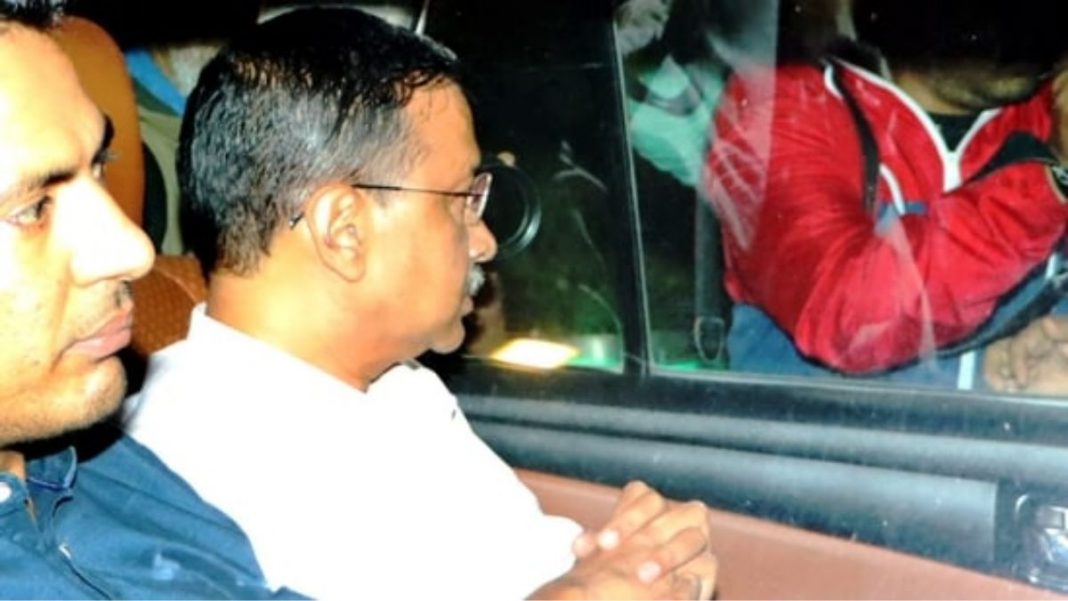In a historic event, Delhi Chief Minister Arvind Kejriwal was arrested by the Enforcement Directorate (ED) on Thursday night in connection with the Delhi liquor policy case. This unprecedented event marks the first time in the history of independent India that a central agency has apprehended a sitting chief minister. In the past, Jharkhand CM Hemant Soren resigned from his post before his arrest. The same is true for Lalu Prasad Yadav, who made his wife the CM in his place.
However, this is not the first time Kejriwal has faced such a situation.
Arrested in 2012: Ruckus Outside PM’s Residence
Kejriwal’s first encounter with arrest came in 2012 amidst the India Against Corruption (IAC) movement. On October 12, 2012, during a protest march towards then Prime Minister Manmohan Singh’s residence at 7, Race Course Road, Kejriwal and fellow demonstrators demanded the dismissal of then Union Law Minister Salman Khurshid over allegations of financial irregularities involving his family-run NGO. Kejriwal, a former joint commissioner of the Income Tax department turned activist, was adamant about the arrest of Khurshid and his wife, Louise Khurshid. The protest turned chaotic, resulting in Kejriwal’s arrest and subsequent detainment at Bawana Jail.
Arrested in 2014: Defamation Case by BJP Leader
In 2014, Kejriwal again faced arrest, this time in a defamation case filed against him by BJP leader Nitin Gadkari. Kejriwal had labelled Gadkari as a “chor (thief)” and included him in a list of “India’s most corrupt.” This arrest occurred following Kejriwal’s resignation as Delhi’s Chief Minister after a tumultuous 49-day tenure. Despite noisy protests by AAP supporters outside Tihar Jail and the detainment of prominent AAP leaders like Manish Sisodia and Sanjay Singh, Kejriwal spent two days in custody before agreeing to a bail bond and securing his release.
The Present Arrest: ED’s Action
Fast forward to 2024, and Kejriwal’s political journey once again intersects with the legal system, this time with the ED arresting him in connection with the alleged liquor policy scam. The arrest, amid high drama and searches at his residence, underscores the continued friction between Kejriwal’s AAP and the central government. As the legal proceedings unfold, Kejriwal’s supporters and critics closely watch the developments, reflecting on the recurring theme of activism, confrontation, and the intersection of law and politics in India.
Protests and Detentions:
During the ensuing protests against Kejriwal’s arrest, AAP ministers Atishi and Saurabh Bharadwaj were detained by the police. The AAP condemned the arrest and vowed to continue their agitation, asserting that Kejriwal would remain the Chief Minister of Delhi despite his incarceration.
Live Updates Till Now:
- The Supreme Court is set to hear Kejriwal’s petition today, with a special bench expected to address the matter.
- AAP workers staged protests in Delhi and other parts of the country, demonstrating against what they perceived as an assault on democracy.
- Amid heightened security outside BJP headquarters and ED offices, the situation remains tense, with opposition leaders expressing solidarity with Kejriwal’s family.
- Rahul Gandhi, Congress leader, has pledged support to Kejriwal’s family and condemned the arrest as unconstitutional and politically motivated.
- The AAP’s stance remains firm, asserting that Kejriwal will continue to serve as Delhi’s Chief Minister despite his arrest.
Implications and Speculations:
The arrest of Kejriwal has sparked debates about the misuse of central agencies for political vendettas and raised questions about the fairness of the legal proceedings. With Lok Sabha polls on the horizon, the case is expected to impact the political landscape significantly.
As the situation continues to evolve, the nation awaits the outcome of the legal proceedings and the response from various political parties.


